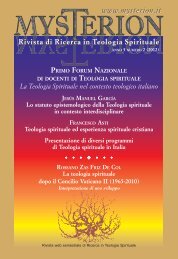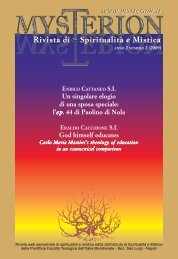Mysterion - rivista di spiritualità e mistica
Mysterion - rivista di spiritualità e mistica
Mysterion - rivista di spiritualità e mistica
Create successful ePaper yourself
Turn your PDF publications into a flip-book with our unique Google optimized e-Paper software.
www.MYS ERION.it<br />
W.R. STOEGER S.J.<br />
77<br />
1 (2008) 64-77<br />
namic environment which possesses it own autonomous character, groun<strong>di</strong>ng the autonomous<br />
character of the persons and communities with which God establishes relationships.<br />
And furthermore it establishes our solidarity with the rest of creation – we<br />
are very much part of it, and ra<strong>di</strong>cally dependent upon it, not isolated from it, as we<br />
sometimes think.<br />
Fifthly, there is the anthropic principle – there is some in<strong>di</strong>cation that the universe has<br />
been fined-tuned for life and consciousness. This can be explained in an interme<strong>di</strong>ate<br />
scientific way by considering our own fine-tuned universe as one of a collection of billions<br />
or even trillions of other universes generated by the same or a connected series of quantum<br />
processes. However, this fine-tuning, just a existence and order, requires an ultimate<br />
explanation which transcends the natural sciences. On a closely related issue, though<br />
cosmic purposefulness cannot be unambiguously <strong>di</strong>scerned within the framework of<br />
the natural sciences, the data provided by them is consistent with such purposefulness.<br />
We cannot conclude to that scientifically, but we certainly cannot rule it out, either!<br />
Sixthly, from the point of view of Christianity, we can say, with George Ellis 3 , that the<br />
universe has been constructed precisely so that self-sacrificing love of persons and generous<br />
self-empyting lea<strong>di</strong>ng to reconciliation and union with God and with one another<br />
are of primary concern and importance. If that is the priority, then the universe should<br />
be constructed the way it has, even with pain and suffering, and death.<br />
Seventh, the harmony between the crucial interplay of death and life in Nature, with<br />
the pain and suffering that entails, and the mystery of death and life given meaning and<br />
significance in the Death and Resurrection of Jesus Christ. The “signum crucis” is writ<br />
large throughout nature and finds its ultimate significance and meaning in Christ.<br />
The Incarnational appreciation of Christianity finds God and God’s presence and<br />
action in things and situations and processes as they are – in all that happens on simple<br />
levels and on more complex levels. And the sciences help reveal things as they are, in<br />
their inter-relationalities and dynamisms. Christianity strongly resists placing God’s action<br />
beyond matter, transience and time. God’s action is precisely in what is concretely<br />
manifested to us in Nature and in Community. But its full significance and meaning is<br />
only revealed in Christ and in what has been promised and what is being fulfilled in his<br />
Death and Resurrection.<br />
3 GEORGE F. R. ELLIS, “The Theology of the Anthropic Principle,” in Quantum Cosmology and the<br />
Laws of Nature: Scientific Perspectives on Divine Action, e<strong>di</strong>ted by ROBERT JOHN RUSSELL, NANCEY MUR-<br />
PHY and C. J. ISHAM, Vatican Observatory Publications, Vatican City State, and Center for Theology and<br />
the Natural Sciences, Berkeley, CA, 1993, pp. 367-405.







